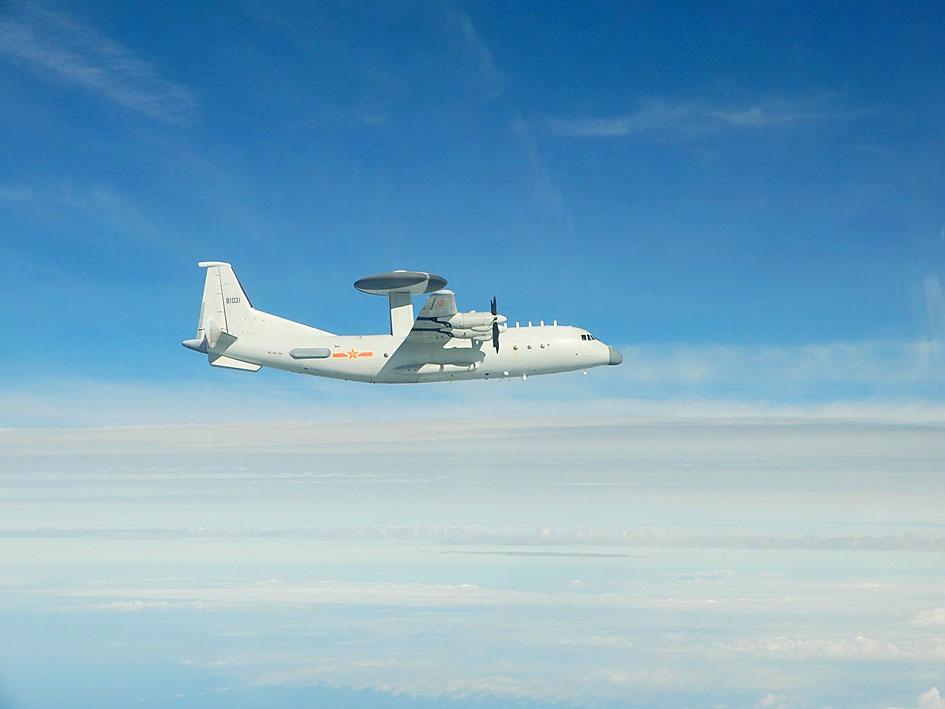The air force yesterday scrambled to warn away 18 Chinese aircraft that entered the nation’s air defense identification zone (ADIZ), the Ministry of National Defense said, part of what is a regular pattern of incursions that has angered Taipei.
Taiwan has complained of repeated such missions by Chinese aircraft, which have become a common occurrence over the past two years or so.
Taiwan is in a heightened state of alert due to fears China could use Russia’s invasion of Ukraine to make a similar military move on the nation, although the government has not reported any signs Beijing is about to attack.

Photo courtesy of the Ministry of National Defense
The number of aircraft involved was well off the last large-scale incursion, 39 Chinese aircraft on Jan. 23, and since then, such flybys have been with far fewer aircraft.
The ministry said the latest mission included six Chinese J-11 and six J-16 fighters, as well as two H-6 bombers.
There was no immediate comment from the Chinese Ministry of National Defense. China has described previous such missions as to defend the nation’s sovereignty and to counter “collusion” with foreign forces — a veiled reference to US support for Taiwan.
The bombers, accompanied by a Y-8 anti-submarine aircraft, flew to the south of Taiwan through the Bashi Channel that separates the nation from the Philippines.
The other aircraft flew over an area to the northeast of the Taiwan-controlled Pratas Islands (Dongsha Islands, 東沙群島) at the top end of the South China Sea, according to a map provided by the Taiwanese ministry.
Taiwanese fighters were sent up to warn the Chinese aircraft and air defense missiles were deployed to “monitor the activities,” it said, using standard wording for how Taiwan describes its response.
No shots have been fired and the Chinese aircraft have not been flying in Taiwan’s air space, but in its ADIZ.
Japan this week reported eight Chinese naval vessels, including an aircraft carrier, passed between islands in Japan’s southern Okinawa chain, to the northeast of Taiwan.

The first global hotel Keys Selection by the Michelin Guide includes four hotels in Taiwan, Michelin announced yesterday. All four received the “Michelin One Key,” indicating guests are to experience a “very special stay” at any of the locations as the establishments are “a true gem with personality. Service always goes the extra mile, and the hotel provides much more than others in its price range.” Of the four hotels, three are located in Taipei and one in Taichung. In Taipei, the One Key accolades were awarded to the Capella Taipei, Kimpton Da An Taipei and Mandarin Oriental Taipei. Capella Taipei was described by

EVA Airways today confirmed the death of a flight attendant on Saturday upon their return to Taiwan and said an internal investigation has been launched, as criticism mounted over a social media post accusing the airline of failing to offer sufficient employee protections. According to the post, the flight attendant complained of feeling sick on board a flight, but was unable to take sick leave or access medical care. The crew member allegedly did not receive assistance from the chief purser, who failed to heed their requests for medical attention or call an ambulance once the flight landed, the post said. As sick

The Taichung District Court yesterday confirmed its final ruling that the marriage between teenage heir Lai (賴) and a man surnamed Hsia (夏) was legally invalid, preventing Hsia from inheriting Lai’s NT$500 million (US$16.37 million) estate. The court confirmed that Hsia chose not to appeal the civil judgement after the court handed down its ruling in June, making the decision final. In the June ruling, the court said that Lai, 18, and Hsia, 26, showed “no mutual admiration before the marriage” and that their interactions were “distant and unfamiliar.” The judge concluded that the couple lacked the “true intention of

INDUSTRY: Beijing’s latest export measures go beyond targeting the US and would likely affect any country that uses Chinese rare earths or related tech, an academic said Taiwanese industries could face significant disruption from China’s newly tightened export controls on rare earth elements, as much of Taiwan’s supply indirectly depends on Chinese materials processed in Japan, a local expert said yesterday. Kristy Hsu (徐遵慈), director of the Taiwan ASEAN Studies Center at the Chung-Hua Institution for Economic Research, said that China’s latest export measures go far beyond targeting the US and would likely affect any country that uses Chinese rare earths or related technologies. With Japan and Southeast Asian countries among those expected to be hit, Taiwan could feel the impact through its reliance on Japanese-made semi-finished products and